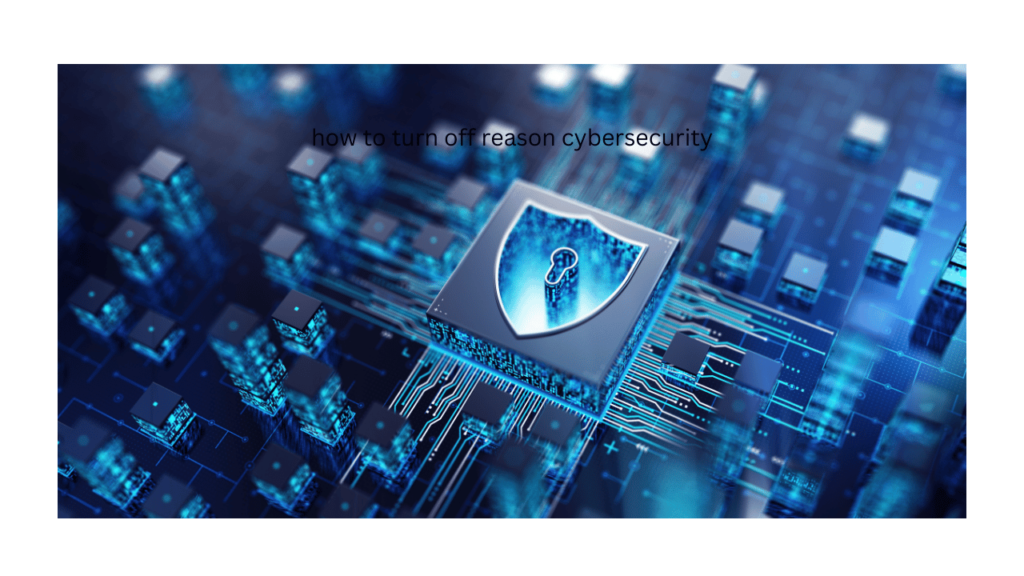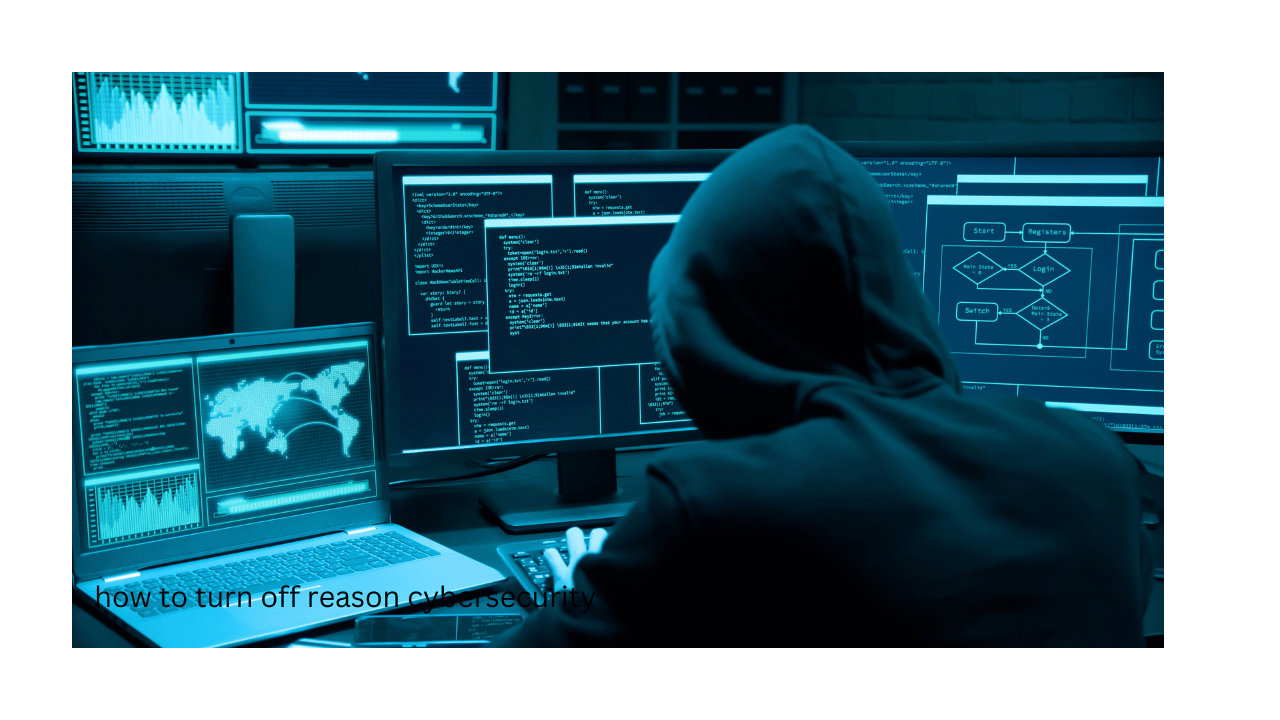In today’s advanced age, where businesses and people depend intensely on innovation for different operations, How to turn off reason cybersecurity has become a vital concern. Cyber dangers proceed to advance, posturing noteworthy dangers to delicate information and by and large advanced security. One vital perspective of cybersecurity regularly neglected is understanding and relieving the reasons behind cyberattacks. In this article, we dig into the significance of turning off reasons in cybersecurity and investigate compelling methodologies to realize this.
Presentation of Cybersecurity Reasons
Cybersecurity reasons allude to the vulnerabilities and escape clauses inside a framework that cyber assailants misuse to pick up unauthorized get to or compromise delicate data. These reasons can run from obsolete programs and powerless passwords to human mistakes and the need for security conventions.
How to Turn Off Reason Cybersecurity
The significance of tending to cybersecurity reasons cannot be exaggerated. Coming up short of recognizing and relieving these reasons takes off frameworks defenseless to assaults, driving to potential information breaches, money-related misfortunes, and harm to notoriety. By proactively turning off reasons, organizations can altogether upgrade their cybersecurity pose and ensure their resources from malevolent on-screen characters.
Understanding the Require for Turning Off Reasons
To successfully oversee cybersecurity, it is basic to get the fundamental reasons behind potential dangers. This requires a comprehensive appraisal of framework vulnerabilities, counting computer program shortcomings, arrangement blunders, and human variables. By distinguishing and tending to these reasons, organizations can preemptively foil cyberattacks and minimize their effects.
Dangers Related to Overlooking Cybersecurity Reasons
Disregarding cybersecurity reasons pose noteworthy dangers to organizations, counting:
Information breaches:
Unauthorized get to to delicate data can result in information breaches, uncovering secret information to malevolent performing artists.
Money-related misfortunes:
Cyberattacks can lead to budgetary misfortunes due to the robbery of stores, emancipate requests, or administrative fines.
Reputational harm:
An information breach or cyber occurrence can discolor an organization’s notoriety and disintegrate client beliefs, leading to long-term results.

Investigating Strategies to Turn Off Reasons in Cybersecurity
To viably turn off reasons in cybersecurity, organizations can execute the following methodologies:
Utilizing Firewall Settings
Firewalls act as a boundary between a trusted inner organize and untrusted outside systems, avoiding unauthorized get to and sifting pernicious activity. How to Turn Off Reason Cybersecurity? Designing firewall settings to piece together suspicious associations can offer assistance for moderate cybersecurity reasons.
Upgrading the Security Program Frequently
Customary overhauls to security computer programs, counting antivirus programs, and interruption location frameworks, are basic for tending to recently found vulnerabilities and reinforcing guards against advancing dangers.
Executing Solid Watchword Arrangements
Implementing solid secret word approaches, such as requiring complex passwords and actualizing multi-factor verification, can altogether diminish the chance of unauthorized get due to frail or compromised passwords.
Conducting Standard Security Reviews
Standard security audits and defenselessness appraisals offer assistance in distinguishing and remediating potential reasons for cyberattacks, guaranteeing that the framework stays secure against developing dangers.
The Part of Worker Preparing to Turn Off Cybersecurity Reasons
Workers play a significant part in cybersecurity, and their activities can either reinforce or debilitate an organization’s protections. Giving comprehensive cybersecurity preparation and raising mindfulness almost potential dangers can engage workers to recognize and relieve security reasons successfully.
Leveraging Encryption to Upgrade Cybersecurity
Encryption may be a principal security degree that ensures information by changing it into an incoherent arrangement, making it confusing to unauthorized parties. How to Turn Off Reason Cybersecurity? Actualizing encryption conventions for touchy information capacity and transmission upgrades cybersecurity by rendering data blocked off to aggressors.
Consolidating Multi-factor Verification (MFA)
Multi-factor confirmation includes an additional layer of security by requiring clients to confirm their character through different components, such as passwords, biometrics, or security tokens. By actualizing MFA, organizations can relieve the hazard of unauthorized get to coming about from compromised qualifications.
Constraining Get to Touchy Information
Limiting access to delicate information based on the guideline of the slightest benefit minimizes the potential effect of security breaches and diminishes the likelihood of unauthorized information presentation.

Checking Organize Activity for Inconsistencies
Nonstop observing organized activity empowers organizations to identify and react to suspicious exercises or unauthorized get-to-its endeavors expeditiously. How to Turn Off Reason Cybersecurity? By distinguishing and exploring irregularities, organizations can moderate cybersecurity reasons some time recently they heighten into full-fledged assaults.
Collaboration with Cybersecurity Specialists
Collaborating with cybersecurity specialists and leveraging their ability can give organizations with profitable bits of knowledge and proposals for upgrading their security posture. Outside reviews and appraisals conducted by experts offer assistance to distinguish dazzle spots and address potential reasons for cyber dangers viably.
Evaluating the Viability of Reason-Turning Measures
Customary assessment of reason-turning measures is basic to guarantee their viability and versatility to advance cybersecurity dangers. By analyzing measurements such as occurrence reaction times, risk location rates, and compliance with security arrangements, organizations can gauge the viability of their cybersecurity endeavors and make vital alterations.
Common Botches to Dodge in Cybersecurity Reason Administration
Dodging common botches in cybersecurity reason administration is significant for keeping up strong protections. How to Turn Off Reason Cybersecurity? A few common pitfalls to dodge include ignoring computer program overhauls, ignoring representative preparation, and coming up short of actualizing comprehensive security conventions.
Future Patterns in Cybersecurity and Reason Administration
As cyber dangers proceed to advance, the scene of cybersecurity and reason administration is anticipated to witness critical headways. Rising innovations such as manufactured insights, machine learning, and quantum cryptography hold a guarantee for upgrading cybersecurity guards and relieving potential reasons for cyberattacks.
Conclusion:
Guaranteeing Strong Cybersecurity through Successful Reason Administration
In conclusion, turning off reasons in cybersecurity is basic for shielding organizations against cyber dangers and relieving potential risks. By receiving proactive measures such as overhauling security programs, actualizing solid secret word approaches, and cultivating a culture of cybersecurity mindfulness, organizations can reinforce their protections and secure their resources from malevolent on-screen characters.
FAQs
What are cybersecurity reasons?
Cybersecurity reasons allude to vulnerabilities and escape clauses inside a framework that cyber assailants abuse to compromise security.
Why is turning off reasons critical in cybersecurity?
Turning off reasons is critical in cybersecurity to relieve the chance of cyberattacks and ensure touchy information from unauthorized get to.
How can organizations successfully turn off reasons in cybersecurity?
Organizations can viably turn off reasons in cybersecurity by executing methodologies such as firewall settings, customary security upgrades, and representative preparation.
What part do representatives play in turning off cybersecurity reasons?
Representatives play a pivotal part in turning off cybersecurity reasons by following to security conventions, recognizing potential dangers, and detailing suspicious exercises.


2 thoughts on “How to Turn Off Reason Cybersecurity 2024?”